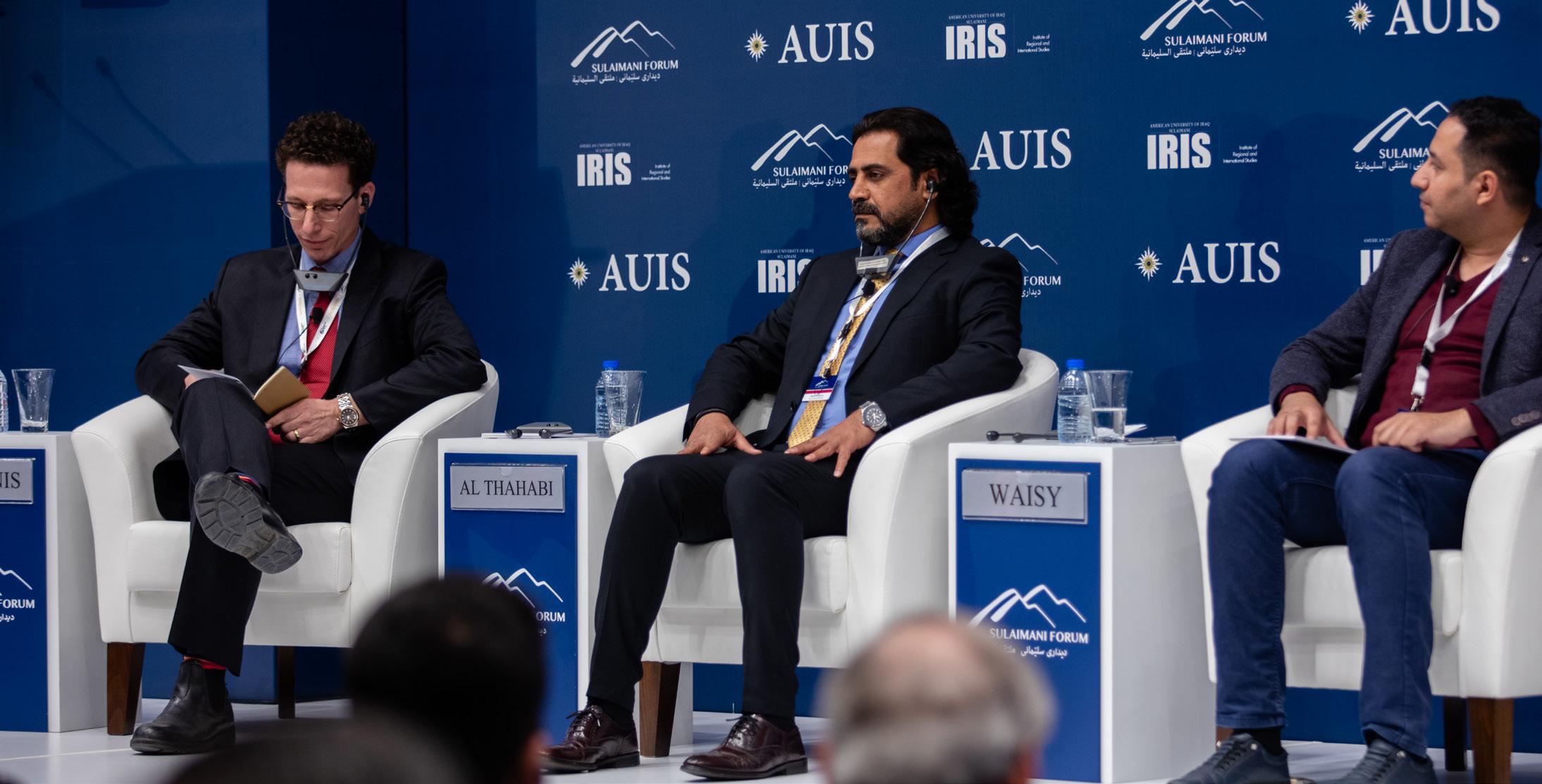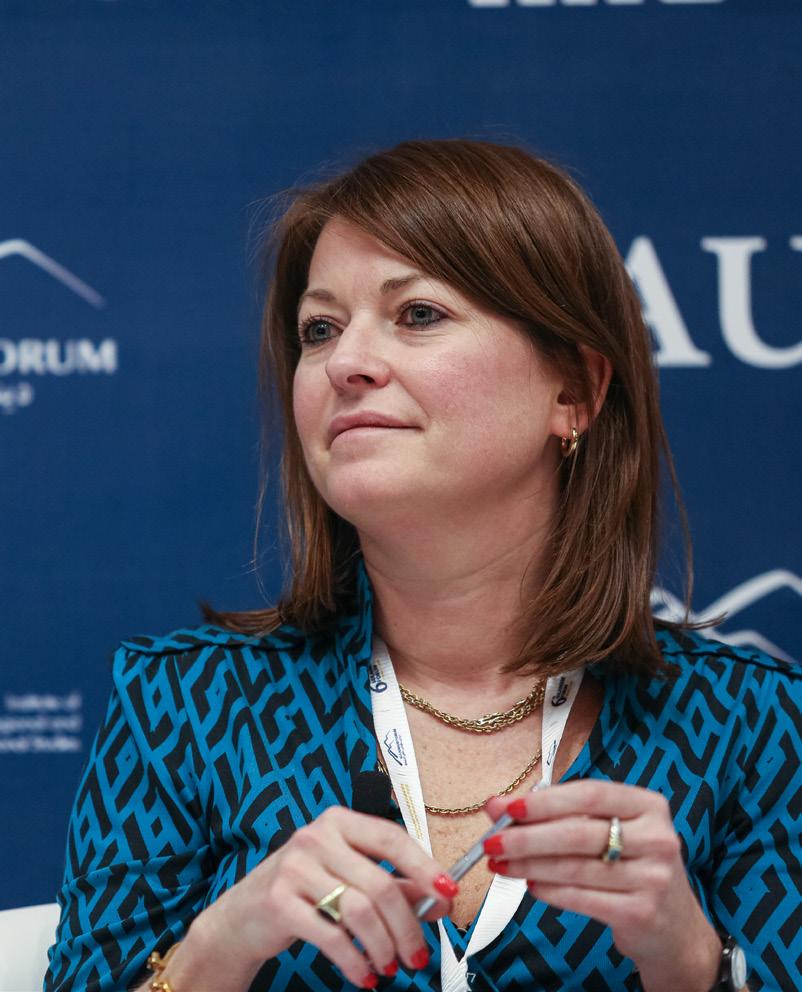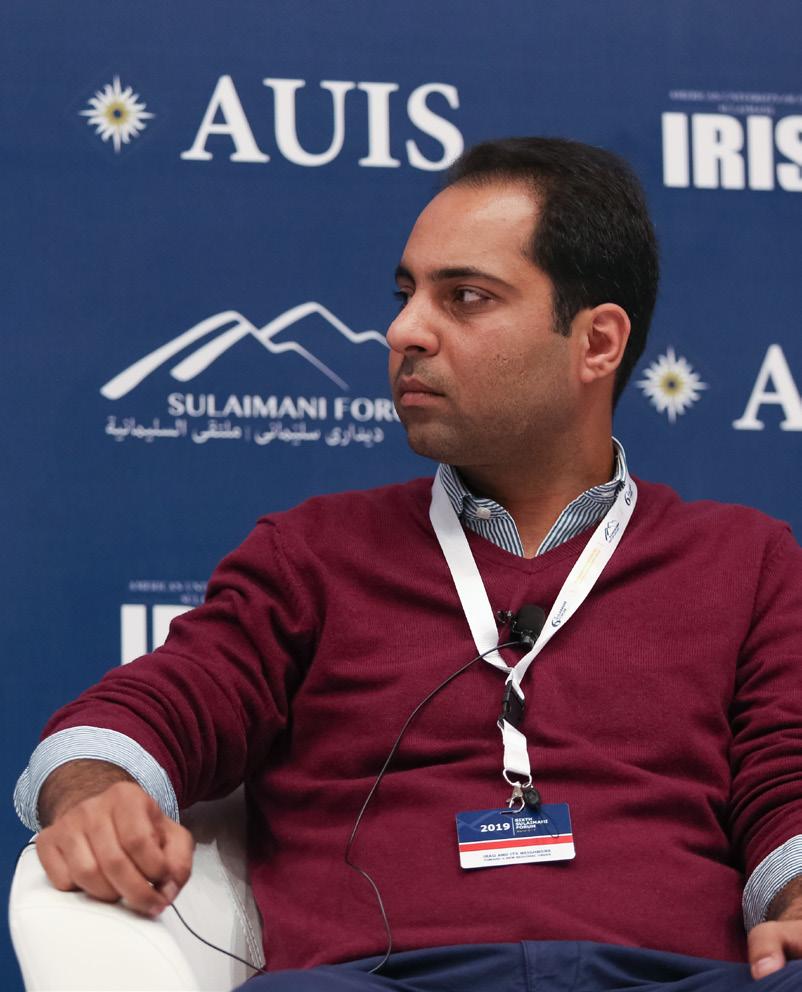
6 minute read
Building Iraq’s Future: Education, Youth, and Employment
from 2019 Sulaimani Forum
by Awder4
Advertisement
Hisham Al Thahabi Iraqi Home for Creativity Mujahid Waisy KAPITA Christine van den Toorn IRIS, AUIS Ammar Amin Founder of the start-up Miswag Marwan Ahmad Co-founder of Mishwar and Representative for Careem
Moderator: Thanassis Cambanis
The Century Foundation
Cambanis began by advising speakers to avoid a vague debate that so often characterizes discussions on youth employment and education. Instead, he encouraged them to use their unique hands-on experience to address specific challenges relating to the issues that Iraqi youth face. Addressing his first question to Hisham Al Thahabi, he questioned whether the youth with whom he works at the Iraq Home for Creativity is part of a “lost generation.” As some analysts believe this notion characterizes a large portion of Iraq’s youth. He also asked about the steps Al Thahabi takes to prepare these children for successful lives. Two questions were posed to Christine van den Toorn, inquiring over whether students who came through AUIS were ready for employment, as well as the biggest challenges they face. To both Mujahid Waisy and Ammar Amin, he asked why they were not part of the phenomenon of brain drain that the country was struggling with.
Hisham Al Thahabi Iraqi Home for Creativity
Al Thahabi answered Cambanis saying that he did not believe the young employees at the Iraqi Home for Creativity are part of a lost generation. The term cannot be applied to all of Iraq’s youth. However, there is a considerable number of young people who have struggled to gain, or have been denied, access to education and health services. Moreover, many young people have been denied a proper environment in which to grow with dignity, have their innocence protected, and reach their full potential. The Iraqi Home for Creativity works with and fosters as many children and teenagers as possible, who are either orphans or have left unsuitable home environments. From his sixteen years of experience, Al Thahabi stated four prerequisites for a successful life that any young person can benefit from and put into practice. First, to specialize in a specific field of study and not be distracted by other possibilities or career paths. The latter can be compared to stretching one’s self horizontally, instead of building up vertically. Second, courage is required to take the first step, which often does not happen for fear of failure. This hesitation often costs young people opportunities that could lead to successful endeavors. Third, it is important to recognize that the road to success is long and requires patience. Finally, and most importantly, one should not compare themselves to others. The real competition is with one’s self and individuals must consistently seek to improve themselves. This attitude must be fostered within family and home environments, and not simply within the context of organizations. “ This is proof of the fact that once any child has the opportunity to grow up in a loving and caring
“environment, that they have the capability of being innovative and contributing members of society.

Mujahid Waisy KAPITA
Waisy argued that the main challenges faced by KAPITA are that college students lacked skilled knowledge and experience, as well as access to finance. Therefore, the work to be done, formerly at The Station and currently at the incubator, is to provide the youth with role models. The mainstream attitude of the youth is that the most important thing is to find a job, regardless of what that job might be. Moreover, many, if not most, believe that they do not need further training and that they know enough about their field of studies. The aim of KAPITA is to use the private sector to persuade young people to take charge and create something, without waiting on government employment. While the support of government is beneficial to provide, and improve on infrastructure, the private sector must take it from there.
“It’s very important to create role models for the youth because [...] most of them think they don’t need training. “

Christine van den Toorn IRIS, AUIS
Christine van den Toorn highlighted four skills that students lack when they come to AUIS, and more generally the majority of Iraqi students when they leave high school. These skills are necessary for employers, both in the civil service and the private sector. The first is the command of English, which is a global language and enables exchanges between cultures and professionals of any given field from all over the world. The second is access to working at both government and private sector companies. The third is a set of hard skills, such as accounting, banking, financing, and even the most basic of finance skills. The fourth are a set of soft skills, such as critical thinking. By seeking to foster these skills in its students, AUIS strives to make them more employable and to empower them to be contributing members of Iraqi society.

“When Iraqi students graduate from high school, there are certain skills that they don’t have that they need to enter the workforce, be that the private sector or the public sector. “
Ammar Amin Founder of the start-up Miswag
Amin began by responding to why he chose to stay in Iraq and contribute to Iraq’s startup ecosystem instead of leaving and being another example of the pervasive brain drain phenomenon. While possessing a general feeling of wanting to give back and help build his country, he also discovered that there was an opportunity to reform the way university professors prepare students for the private sector through revising the curriculum. In particular, the method by which many university professors instruct prepares students for academia instead of the job market. Therefore, as a professor of computer science, he decided to try a new approach that relied less on theory and more on hands-on experience and teamwork. Moreover, in recruitment, he does not give importance to the field of study that students have majored in, but focuses on recruiting people who are smart and have an aptitude to learn new skills, emphasizing that the two most important skills are English and Microsoft Office. Miswag then invests in improving the capacity of these employees through trainings.
“Most university lecturers follow a teaching scheme that converts the students into academics [...] They rarely do any hands-on experience on anything they teach.

Ahmad said that strong talent and skills are typically products of the higher education system or result from training in technical and developed industries in the private sector. He stated that neither the higher education system nor the private sector are undertaking this training in Iraq, adding that in the short term it is impossible to revolutionize the entire higher education system. The result is that there are people in the workforce who are on the same level as those who are self-taught by exploring YouTube or the internet. Therefore, when hiring, he looks for raw talent like basic arithmetic questions and logic. Careem is launching a large-scale program called Careem Ambassadors, to recruit people from universities who may have little to no experience, but they have talent, ability, and the hunger to learn.

“We tell people: ‘Don’t tell me the answer. We want to know: how did you get to that answer?’ We want to see how that person has that ability to learn, and we go and hire and invest in them. “










